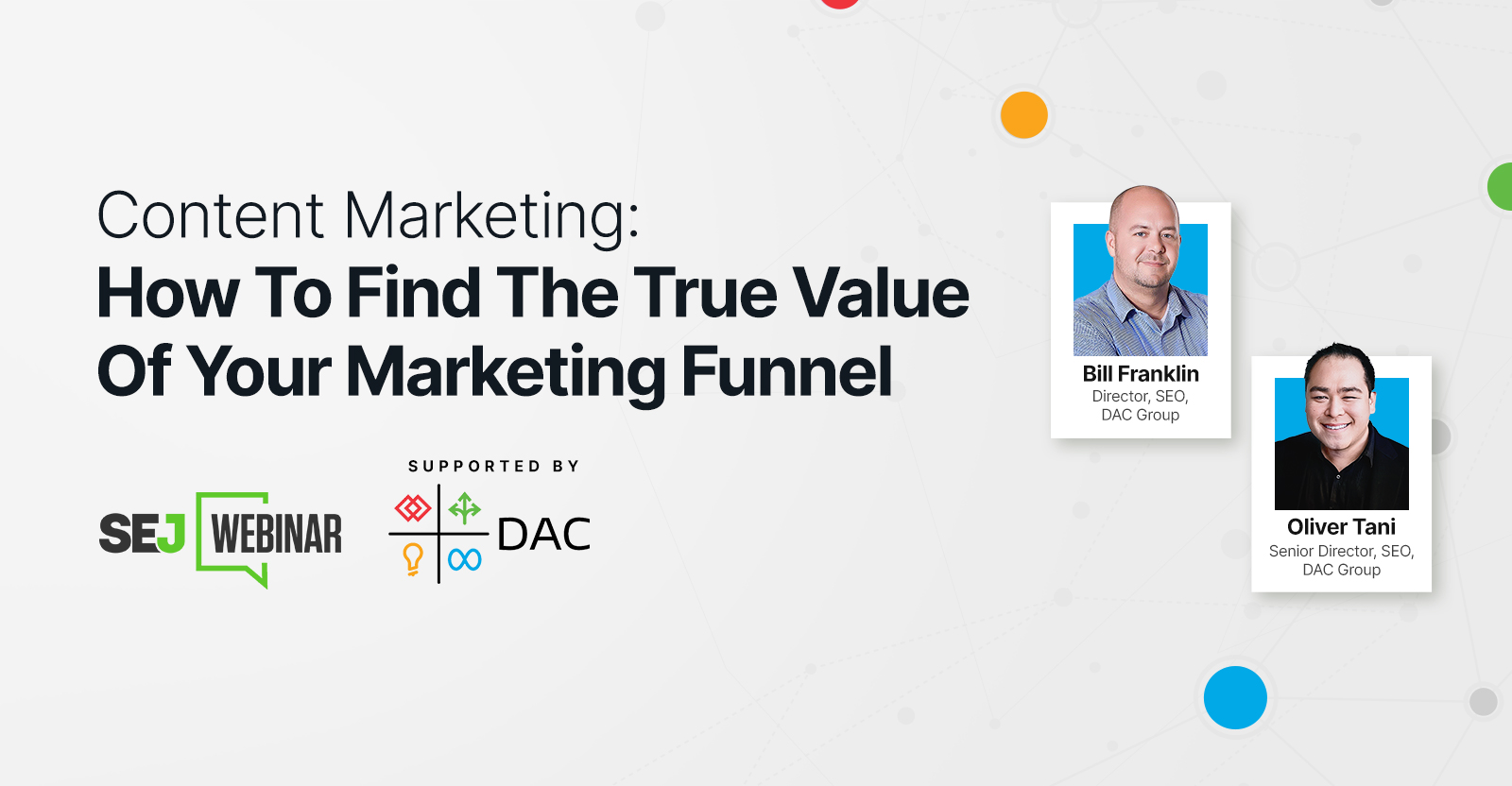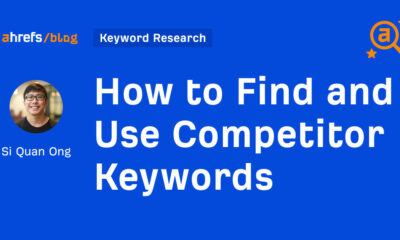SEO
How To Beat Your Competition Using Only SERPs

This post was sponsored by Bright Data. The opinions expressed in this article are the sponsor’s own.
Wondering how you can easily beat your competition without adding another tool to your marketing stack?
The answers to how your competition is beating you are available to you – for free.
Where? How?
In SERP data on SERPs.
What Is A SERP & How Does It Help Me Beat My Competitors?
Search engine results pages (SERPs) are the results shown when you search for anything on search engines like Google, Bing, and more.
SERP data is the information located within each individual result on the SERP.
This data is free-to-see, public web data that can help you improve and boost your position in search engines around the world.
You can pull SERP information from both paid and organic search results, and get full visibility into what your competition is doing.
You can use SERPs to:
- Uncover hidden trends.
- Improve paid advertising.
- Expose content gaps.
- Understand how content performs from region to region.
But how do you easily find this information to better your content?
Have it automatically collected by a SERP scraper.
Get the data immediately, so you can start building your SEO strategy faster.
Easily Collect Free Competitor Information Using SERP Scrapers
SERP scrapers, or SERP AIs, can easily and automatically collect SERP data from different search engines.
Long story short, there is a lot of great data to collect, due to the different factors that affect a SERP, such as location, search history, and device.
These ever-increasing factors continue to make it difficult to perform manual SERP data collection.
With SERP scrapers, you no longer need to do it by hand.
Instead, these SERP AIs allow you to automate the data collection process, pulling web data from countless different sources at once, in real-time, in order to gather large volumes of data.
In turn, you get greater visibility into competitor research as the scale of the job increases – and overall saves time.
Automate Competitor Research & Free Up Bandwidth With SERP Scrapers
To fully automate SERP data collection, companies are running their SERP scrapers through public web data collection infrastructures.
SERP scraper automation can help you:
- Instantly see what SERP content is working for your competitors.
- Geotarget requests from users to understand different targeting techniques.
- Understand SERP intent from all angles, down to how a device matches users’ needs.
- Unlock content behind walls that block search engine bots, such as CAPTCHA solving.
How To Setup Your Own SERP Scraper
Some companies create their own SERP scrapers from scratch, but this can be a time-consuming option.
Luckily, there are other, faster options.
Use SERP APIs
Many web data providers offer SERP APIs that require little to no coding experience to collect web data from the result pages.
These tools are specially designed to target all the major search engines, and automatically pull data from the result pages.
Once you’ve chosen your SERP scraper, it’s time to configure the AI and start getting access to free competitor data.
Configure Your Research Parameters
Using your SERP API dashboard, you will be able to designate the different parameters for search requests, custom to your workflow and data needs.
You can choose specific parameters for your scrape, such as:
- Geo-targeting.
- Language used.
- Search filters.
- Safe mode SERPs.
- Device used.
- SERP features, such as maps, shopping, hotels, flights, news, etc.
Increase SERP Access
Similar to data collection infrastructure, some SERP AI tools have unblocking technology to help your scraper search like a real person.
Your scraper should be able to bypass CAPTCHA checks in order to help you get the full competitor breakdown.
Setup Automatic Algorithm Updates
The SERP API you choose should be able to make updates when changes to the results page are made by the search engines.
This is specifically helpful considering there are constant changes being made to the structure and algorithms of SERPs, and new features are being added to these pages more and more frequently.
If your scraper is not up to date, it will either return inaccurate data or be unable to read the page and deliver the data desired by the request.
What To Look Out For If You Create An In-House SERP Scraper
If you were to create a scraper in-house, you would need to regularly update the scraper’s code manually to ensure that it matches the structure of the website.
However, when using a SERP API designed by a web data provider, you do not need to be bothered with this process.
Providers typically monitor changes to all the major search engines and update the scraper accordingly to ensure accurate and uninterrupted real-time data collection.
How To Compile SERP Data Using A SERP Scraper – A Simple Example
Let’s say you wanted to collect public web data on a hotel – including prices, availability, reviews, and more.
How To Conduct Hotel Competitor SERP Research By Hand
If you were to research this SERP manually, Google Search and Google Travel are great tools to use to uncover free research and data.
- Enter the hotel’s name into Google Search.
- Notice the initial details in the resulting knowledge graph, such as reviews, specific arrival and departure dates, and the number of guests.
- Compare prices to understand what competitive packages you can offer to compete.
- Uncover booking popularity in order to drive your own campaigns and sales.
- Continue to manually dive deeper and uncover more data.
From here, you can begin to create your strategy, which will open up more avenues to manually research more options and data points.
How To Conduct Hotel Competitor SERP Research Automatically
Through SERP API, you can do all of that automatically.
- Steps 1 – 5 are completed by SERP APIs, and include new parameters, such as price comparisons, dates, ages of the guests, whether free cancellation is included, and more to collect additional price combinations.
Competitor research is done for you, so you can start creating your new strategy.
An example of what these searches would look like can be found here.
Make It Easy: Let Us Scrape SERPs For You
Fundamentally, in today’s world, SERP data provides the building blocks and direction for digital marketers to improve their rankings in search engines across the world. For this reason, a mass amount of public web data is needed.
In order to automate this web scraping process, companies are using SERP scrapers designed by web data providers to pull accurate results from the web in real time, which has significantly improved the manual process this task originated from.
Overall, with the help of web data providers, gathering large-scale amounts of SERP data is a much more manageable task than it was even a few years ago, and now, companies are able to sit back, relax, and watch the data roll in – saving both time and effort in the long-run, and helping companies focus on what matters most: the insights.
For more information on how web data collection can help your business, please visit Bright Data.
Image Credits
Featured Image: Bright Data
SEO
Measuring Content Impact Across The Customer Journey

Understanding the impact of your content at every touchpoint of the customer journey is essential – but that’s easier said than done. From attracting potential leads to nurturing them into loyal customers, there are many touchpoints to look into.
So how do you identify and take advantage of these opportunities for growth?
Watch this on-demand webinar and learn a comprehensive approach for measuring the value of your content initiatives, so you can optimize resource allocation for maximum impact.
You’ll learn:
- Fresh methods for measuring your content’s impact.
- Fascinating insights using first-touch attribution, and how it differs from the usual last-touch perspective.
- Ways to persuade decision-makers to invest in more content by showcasing its value convincingly.
With Bill Franklin and Oliver Tani of DAC Group, we unravel the nuances of attribution modeling, emphasizing the significance of layering first-touch and last-touch attribution within your measurement strategy.
Check out these insights to help you craft compelling content tailored to each stage, using an approach rooted in first-hand experience to ensure your content resonates.
Whether you’re a seasoned marketer or new to content measurement, this webinar promises valuable insights and actionable tactics to elevate your SEO game and optimize your content initiatives for success.
View the slides below or check out the full webinar for all the details.
SEO
How to Find and Use Competitor Keywords

Competitor keywords are the keywords your rivals rank for in Google’s search results. They may rank organically or pay for Google Ads to rank in the paid results.
Knowing your competitors’ keywords is the easiest form of keyword research. If your competitors rank for or target particular keywords, it might be worth it for you to target them, too.
There is no way to see your competitors’ keywords without a tool like Ahrefs, which has a database of keywords and the sites that rank for them. As far as we know, Ahrefs has the biggest database of these keywords.
How to find all the keywords your competitor ranks for
- Go to Ahrefs’ Site Explorer
- Enter your competitor’s domain
- Go to the Organic keywords report
The report is sorted by traffic to show you the keywords sending your competitor the most visits. For example, Mailchimp gets most of its organic traffic from the keyword “mailchimp.”


Since you’re unlikely to rank for your competitor’s brand, you might want to exclude branded keywords from the report. You can do this by adding a Keyword > Doesn’t contain filter. In this example, we’ll filter out keywords containing “mailchimp” or any potential misspellings:


If you’re a new brand competing with one that’s established, you might also want to look for popular low-difficulty keywords. You can do this by setting the Volume filter to a minimum of 500 and the KD filter to a maximum of 10.


How to find keywords your competitor ranks for, but you don’t
- Go to Competitive Analysis
- Enter your domain in the This target doesn’t rank for section
- Enter your competitor’s domain in the But these competitors do section


Hit “Show keyword opportunities,” and you’ll see all the keywords your competitor ranks for, but you don’t.


You can also add a Volume and KD filter to find popular, low-difficulty keywords in this report.


How to find keywords multiple competitors rank for, but you don’t
- Go to Competitive Analysis
- Enter your domain in the This target doesn’t rank for section
- Enter the domains of multiple competitors in the But these competitors do section


You’ll see all the keywords that at least one of these competitors ranks for, but you don’t.


You can also narrow the list down to keywords that all competitors rank for. Click on the Competitors’ positions filter and choose All 3 competitors:


- Go to Ahrefs’ Site Explorer
- Enter your competitor’s domain
- Go to the Paid keywords report


This report shows you the keywords your competitors are targeting via Google Ads.
Since your competitor is paying for traffic from these keywords, it may indicate that they’re profitable for them—and could be for you, too.
You know what keywords your competitors are ranking for or bidding on. But what do you do with them? There are basically three options.
1. Create pages to target these keywords
You can only rank for keywords if you have content about them. So, the most straightforward thing you can do for competitors’ keywords you want to rank for is to create pages to target them.
However, before you do this, it’s worth clustering your competitor’s keywords by Parent Topic. This will group keywords that mean the same or similar things so you can target them all with one page.
Here’s how to do that:
- Export your competitor’s keywords, either from the Organic Keywords or Content Gap report
- Paste them into Keywords Explorer
- Click the “Clusters by Parent Topic” tab


For example, MailChimp ranks for keywords like “what is digital marketing” and “digital marketing definition.” These and many others get clustered under the Parent Topic of “digital marketing” because people searching for them are all looking for the same thing: a definition of digital marketing. You only need to create one page to potentially rank for all these keywords.


2. Optimize existing content by filling subtopics
You don’t always need to create new content to rank for competitors’ keywords. Sometimes, you can optimize the content you already have to rank for them.
How do you know which keywords you can do this for? Try this:
- Export your competitor’s keywords
- Paste them into Keywords Explorer
- Click the “Clusters by Parent Topic” tab
- Look for Parent Topics you already have content about
For example, if we analyze our competitor, we can see that seven keywords they rank for fall under the Parent Topic of “press release template.”


If we search our site, we see that we already have a page about this topic.


If we click the caret and check the keywords in the cluster, we see keywords like “press release example” and “press release format.”


To rank for the keywords in the cluster, we can probably optimize the page we already have by adding sections about the subtopics of “press release examples” and “press release format.”
3. Target these keywords with Google Ads
Paid keywords are the simplest—look through the report and see if there are any relevant keywords you might want to target, too.
For example, Mailchimp is bidding for the keyword “how to create a newsletter.”


If you’re ConvertKit, you may also want to target this keyword since it’s relevant.
If you decide to target the same keyword via Google Ads, you can hover over the magnifying glass to see the ads your competitor is using.


You can also see the landing page your competitor directs ad traffic to under the URL column.


Learn more
Check out more tutorials on how to do competitor keyword analysis:
SEO
Google Confirms Links Are Not That Important

Google’s Gary Illyes confirmed at a recent search marketing conference that Google needs very few links, adding to the growing body of evidence that publishers need to focus on other factors. Gary tweeted confirmation that he indeed say those words.
Background Of Links For Ranking
Links were discovered in the late 1990’s to be a good signal for search engines to use for validating how authoritative a website is and then Google discovered soon after that anchor text could be used to provide semantic signals about what a webpage was about.
One of the most important research papers was Authoritative Sources in a Hyperlinked Environment by Jon M. Kleinberg, published around 1998 (link to research paper at the end of the article). The main discovery of this research paper is that there is too many web pages and there was no objective way to filter search results for quality in order to rank web pages for a subjective idea of relevance.
The author of the research paper discovered that links could be used as an objective filter for authoritativeness.
Kleinberg wrote:
“To provide effective search methods under these conditions, one needs a way to filter, from among a huge collection of relevant pages, a small set of the most “authoritative” or ‘definitive’ ones.”
This is the most influential research paper on links because it kick-started more research on ways to use links beyond as an authority metric but as a subjective metric for relevance.
Objective is something factual. Subjective is something that’s closer to an opinion. The founders of Google discovered how to use the subjective opinions of the Internet as a relevance metric for what to rank in the search results.
What Larry Page and Sergey Brin discovered and shared in their research paper (The Anatomy of a Large-Scale Hypertextual Web Search Engine – link at end of this article) was that it was possible to harness the power of anchor text to determine the subjective opinion of relevance from actual humans. It was essentially crowdsourcing the opinions of millions of website expressed through the link structure between each webpage.
What Did Gary Illyes Say About Links In 2024?
At a recent search conference in Bulgaria, Google’s Gary Illyes made a comment about how Google doesn’t really need that many links and how Google has made links less important.
Patrick Stox tweeted about what he heard at the search conference:
” ‘We need very few links to rank pages… Over the years we’ve made links less important.’ @methode #serpconf2024″
Google’s Gary Illyes tweeted a confirmation of that statement:
“I shouldn’t have said that… I definitely shouldn’t have said that”
Why Links Matter Less
The initial state of anchor text when Google first used links for ranking purposes was absolutely non-spammy, which is why it was so useful. Hyperlinks were primarily used as a way to send traffic from one website to another website.
But by 2004 or 2005 Google was using statistical analysis to detect manipulated links, then around 2004 “powered-by” links in website footers stopped passing anchor text value, and by 2006 links close to the words “advertising” stopped passing link value, links from directories stopped passing ranking value and by 2012 Google deployed a massive link algorithm called Penguin that destroyed the rankings of likely millions of websites, many of which were using guest posting.
The link signal eventually became so bad that Google decided in 2019 to selectively use nofollow links for ranking purposes. Google’s Gary Illyes confirmed that the change to nofollow was made because of the link signal.
Google Explicitly Confirms That Links Matter Less
In 2023 Google’s Gary Illyes shared at a PubCon Austin that links were not even in the top 3 of ranking factors. Then in March 2024, coinciding with the March 2024 Core Algorithm Update, Google updated their spam policies documentation to downplay the importance of links for ranking purposes.
The documentation previously said:
“Google uses links as an important factor in determining the relevancy of web pages.”
The update to the documentation that mentioned links was updated to remove the word important.
Links are not just listed as just another factor:
“Google uses links as a factor in determining the relevancy of web pages.”
At the beginning of April Google’s John Mueller advised that there are more useful SEO activities to engage on than links.
Mueller explained:
“There are more important things for websites nowadays, and over-focusing on links will often result in you wasting your time doing things that don’t make your website better overall”
Finally, Gary Illyes explicitly said that Google needs very few links to rank webpages and confirmed it.
I shouldn’t have said that… I definitely shouldn’t have said that
— Gary 鯨理/경리 Illyes (so official, trust me) (@methode) April 19, 2024
Why Google Doesn’t Need Links
The reason why Google doesn’t need many links is likely because of the extent of AI and natural language undertanding that Google uses in their algorithms. Google must be highly confident in its algorithm to be able to explicitly say that they don’t need it.
Way back when Google implemented the nofollow into the algorithm there were many link builders who sold comment spam links who continued to lie that comment spam still worked. As someone who started link building at the very beginning of modern SEO (I was the moderator of the link building forum at the #1 SEO forum of that time), I can say with confidence that links have stopped playing much of a role in rankings beginning several years ago, which is why I stopped about five or six years ago.
Read the research papers
Authoritative Sources in a Hyperlinked Environment – Jon M. Kleinberg (PDF)
The Anatomy of a Large-Scale Hypertextual Web Search Engine
Featured Image by Shutterstock/RYO Alexandre
-

 PPC4 days ago
PPC4 days ago19 Best SEO Tools in 2024 (For Every Use Case)
-
SEARCHENGINES7 days ago
Daily Search Forum Recap: April 16, 2024
-

 SEO7 days ago
SEO7 days agoGoogle Clarifies Vacation Rental Structured Data
-

 MARKETING6 days ago
MARKETING6 days agoStreamlining Processes for Increased Efficiency and Results
-
SEARCHENGINES6 days ago
Daily Search Forum Recap: April 17, 2024
-

 SEO6 days ago
SEO6 days agoAn In-Depth Guide And Best Practices For Mobile SEO
-

 PPC6 days ago
PPC6 days ago97 Marvelous May Content Ideas for Blog Posts, Videos, & More
-
SEARCHENGINES5 days ago
Daily Search Forum Recap: April 18, 2024















You must be logged in to post a comment Login